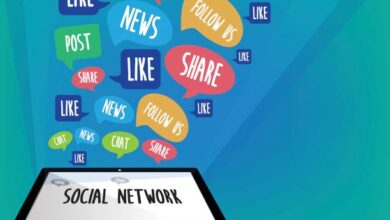What is social media in words?

What is social media in words? A complex question, yet incredibly straightforward. It is the convergence of communication, technology, and human interaction. But in the true essence of the phrase, what is social media? To unravel this digital conundrum, let’s delve into its definition, purpose, role, impact, influence, and even its dark side.
A Brief and Basic Definition of Social Media
Think of social media as a global, digital gathering spot, where conversations, connections, and creativity blossom. It’s a collection of internet-based platforms that bridge the gap between distances, dissolve barriers of communication and turn the world into one large, interactive community. Picture it as an ever-evolving digital playground that enables people from all corners of the globe to share ideas, express themselves, collaborate, and connect.
Through the looking glass of social media, lines between the public and private, the professional and personal, the local and the global, all get beautifully blurred. It’s not just about individual conversations, but also about the collective exchange of information, opinions, and experiences.
Imagine a bulletin board that the entire world can see and contribute to, a party line that everyone can chime into, or a town square where the global populace can congregate, all wrapped into one. That, in essence, is social media.
But it’s more than just a space for interactions. It’s an arena for individuals, businesses, organizations, and even governments to create, share, and exchange information in virtual networks and communities. It’s the perfect blend of communication, technology, and human interaction, creating a dynamic, fast-paced, and ever-changing environment.
So, next time you update your status, share a post, or comment on someone else’s story, remember that you are a part of a global dialogue, contributing to the immense and fascinating world that is social media. And it’s this world that brings us all a bit closer, helps us understand each other better, and makes our planet feel just a little bit smaller.
The Power and Purpose of Social Media
Social media wields a dual-edged sword of connectivity and knowledge. On one side, it binds us together, bridging geographical and cultural gaps, enabling us to forge friendships, rekindle old ties, and express ourselves. On the other, it stands as an information powerhouse, disseminating everything from news flashes to educational material and entertainment.
The purpose of social media is far more profound than a platform for simple chit-chat. It’s a conduit for interaction, stirring engagement, and fostering a sense of community. It has democratized the distribution of information, providing a soapbox to everyone with internet access. Now, everyone’s voice can be heard.
Whether you’re a teenager in Tokyo sharing a Manga-inspired artwork or a grandmother in Nebraska posting a family recipe, social media offers a platform to share, learn and engage. It connects the rural farmer in Kenya seeking agricultural advice to an agronomist across the globe. It’s where a college student finds solace in a mental health forum, no longer feeling alone with their struggle.
In the realm of news, it’s an important tool in our arsenal. As breaking news travels faster than ever, we’re kept informed and alert, with access to various viewpoints on every story. As a learning tool, it offers an ocean of knowledge at our fingertips, from DIYs and lifehacks to academic lectures and online courses.
Thus, the power of social media lies in its ability to connect us, inform us, and give us a voice. It has handed us a global microphone and invites us to engage, learn, and contribute. Remember, each time you post, comment, or share, you’re adding to this global exchange of ideas, making the world a little more connected and a lot more informed.
The Role of Social Media in Personal Life
In the context of our personal lives, social media takes center stage as a vibrant, multifunctional platform. Picture it as a canvas for expressing our thoughts, a megaphone for our voices, and a kaleidoscope that brings the world to our doorstep. Through it, we get to pen our life’s narrative, sharing everything from our joys and sorrows to our dreams and aspirations.
Every status update or photo share is a bit of our life story, a piece of our identity on display. It’s a chance to project our voice, assert our individuality, and leave our digital footprints in the sands of the internet. Social media is a mirror that reflects our life journey, with all its highs and lows, triumphs and setbacks.
Beyond expression, it serves as a lifeline to our social network. Through likes, shares, and comments, we participate in the ebb and flow of conversations, fostering a sense of community and connectedness. In the grand theater of social media, every interaction, every emoji, every meme is a form of dialogue, bringing us closer to our friends and family.
Additionally, social media acts as a window, framing the world for us.
Through it, we can explore different cultures, learn about current events, discover new interests, and even join global movements. It’s like having a front-row seat to the world, offering a panoramic view of human life in all its diversity and complexity.
In the rhythm of our daily lives, social media plays a compelling beat. It’s woven into the fabric of our routines – from morning scrolls through our newsfeeds to night-time shares of our day’s highlight reel. It’s our digital companion, accompanying us through our day, recording our moments, and connecting us with the world.
However, as we embrace the magic of social media, we should also be mindful of its potential pitfalls. Striking a balance between our digital and physical lives is crucial, ensuring we maintain meaningful offline connections and safeguard our mental wellbeing.
In the end, it’s clear that social media isn’t just part of our personal lives. It’s a vibrant tapestry of our shared human experience, a testament to our collective narrative.
The Impact of Social Media on Businesses
In the corporate world, social media has triggered a paradigm shift. Consider it as a dynamic marketplace where businesses can interact, innovate, and influence on a scale never seen before. Social media allows companies to connect directly with customers, bypassing traditional marketing channels and fostering a more organic relationship.
Think of it as a bustling digital town square, where customers and companies convene, converse and collaborate. Businesses, from startups to multinational corporations, utilize these platforms to showcase their brand, products, and services. Every post, tweet, or update is a chance to tell their story, shape their image, and reinforce their brand values.
The business benefits of social media are manifold. It offers real-time customer feedback, providing invaluable insights into consumer preferences and behavior. The ability to engage with customers, address their concerns promptly, and publicly demonstrate their commitment to customer satisfaction has a profound impact on brand loyalty and reputation.
Furthermore, social media opens the door to innovative marketing strategies.
Influencer partnerships, user-generated content, viral marketing campaigns, all these are made possible by social media. It’s like having a billboard that is not confined by geography or time, constantly beaming messages to the connected world.
Lead generation and sales have also been revolutionized by social media. It facilitates targeted advertising, where businesses can reach potential customers based on their online behavior, interests, and demographics. This unprecedented level of personalization makes marketing campaigns more effective and cost-efficient.
From a market research perspective, social media is a gold mine of data. By analyzing social media trends and sentiments, businesses can gain a pulse on the market, foresee shifts in consumer demand, and stay ahead of the curve.
In essence, social media has transformed the business landscape. It has broken down walls, bringing companies and customers onto the same platform, fostering transparency, accountability, and mutual engagement. It’s a dynamic ecosystem where businesses are no longer faceless entities, but part of a vibrant, interactive community. Each tweet, post, or share is a thread in the intricate web of digital commerce. And with each interaction, businesses are not just selling; they’re connecting, engaging, and evolving.
The Sociopolitical Influence of Social Media
Social media has undeniably etched itself into the fabric of our sociopolitical systems. It’s a platform that can spark discussions, drive change, and influence perceptions on a global scale. Whether it’s championing a social cause, raising awareness about pressing issues, or shaping public opinion, social media has empowered citizens like never before.
Imagine it as a digital soapbox, accessible to all, breaking down the barriers of traditional power dynamics. It provides an avenue for people to question, debate, advocate, and mobilize for causes they care about. Social media has even breathed life into grassroots movements, amplifying their voices, and spreading their messages across borders.
From the Arab Spring to the #BlackLivesMatter movement, history stands testament to the potency of social media as a tool for political activism.

It enables real-time rallying, turning hashtags into global cries for change, and trending topics into virtual demonstrations.
Moreover, social media has had a significant impact on the electoral process. Candidates use these platforms to communicate directly with voters, sharing their policies, and rallying support. Campaign strategies have been redrawn to incorporate social media outreach, acknowledging its influence over public sentiment.
However, it’s important to note that this influential power isn’t always wielded for the greater good. Misinformation can spread like wildfire on these platforms, distorting truths, and manipulating beliefs. Social media can also be used to amplify divisive rhetoric, creating echo chambers that stifle balanced discourse.
So, while it’s fascinating to see how social media is reshaping our sociopolitical landscapes, it’s equally critical to be mindful of its potential misuse. Navigating this space with discernment is key, questioning what we read and share, encouraging healthy discourse, and respecting diverse opinions. Thus, the influence of social media in our sociopolitical sphere is as immense as it is complex, reflecting the dual nature of this digital powerhouse.
The Dark Side of Social Media
While social media lights up our digital world, it casts an inevitable shadow. This darker realm of the online world is a place where the lines of virtual and real-life harm blur, casting negative impacts on the lives of individuals. It’s an ecosystem where the seeds of cyberbullying and online harassment often sprout, leaving victims in emotional distress and in some cases, even leading to tragic outcomes.
In this digital age where ‘likes’ are the new currency for validation, self-worth can precariously hinge on these digital nods of approval. When the applause fades, it can often lead to a sharp fall in self-esteem, especially amongst vulnerable young users. Such instances highlight the power that social media can wield over our mental health.
Another dark alley in the world of social media is the proliferation of misinformation or ‘fake news.’ This wildfire-like spread of half-truths and outright lies can have dire consequences, fueling fear, fostering division, and even inciting violence. It’s like a hall of mirrors where distorted versions of reality can manipulate public opinion, sometimes with devastating effects.
Perhaps one of the most significant concerns that shadows social media is the issue of privacy.
The virtual landscape is fraught with instances of data breaches and misuse, triggering a global outcry for improved data protection practices. It’s akin to a digital Big Brother, where every click, like, and share might be watched, recorded, and used without our explicit consent.
While social media adds color to our digital lives, it’s important to remember that it can also add a touch of gray. It’s like a thrilling roller coaster ride that can be exciting and enjoyable but can also have its scary dips and turns. Therefore, being aware of these risks, taking protective measures, and promoting responsible behavior can help make our online experience safer, healthier, and more fulfilling.
The Future of Social Media
As we move forward, social media will continue to morph and evolve. With advancements like AI, virtual reality and real-time content, the way we use and interact with social media will transform. However, it’s crucial that we navigate these changes responsibly, addressing concerns surrounding privacy and misinformation to create a safer, more transparent digital world.



